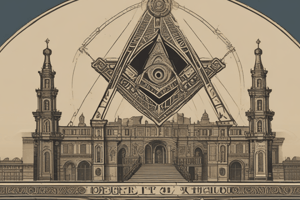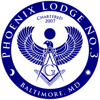Podcast
Questions and Answers
What is the purpose of appointing an Investigating Committee in Freemasonry?
What is the purpose of appointing an Investigating Committee in Freemasonry?
- To serve as the Worshipful Master.
- To conduct Stated Communications.
- To organize Lodge of Sorrow ceremonies.
- To review and ensure the applicant's good character and compatibility with the Fraternity. (correct)
When does a Stated Communication occur in Freemasonry?
When does a Stated Communication occur in Freemasonry?
- During conferral of degrees.
- At regular monthly meetings. (correct)
- Only during Lodge of Sorrow ceremonies.
- At every formal meeting of the lodge.
What is the primary purpose of a Called Communication in Freemasonry?
What is the primary purpose of a Called Communication in Freemasonry?
- To initiate new members into the Fraternity.
- To confer Last Masonic Rites on deceased brothers.
- To formally open the lodge for special meetings. (correct)
- To appoint Investigating Committees.
During which type of communication is an Investigating Committee typically appointed in Freemasonry?
During which type of communication is an Investigating Committee typically appointed in Freemasonry?
What event triggers the appointment of an Investigating Committee in Freemasonry?
What event triggers the appointment of an Investigating Committee in Freemasonry?
What is the next step after the Investigating Committee recommends a petition for adoption or rejection?
What is the next step after the Investigating Committee recommends a petition for adoption or rejection?
What was the requirement for a petitioner to be officially accepted into the lodge?
What was the requirement for a petitioner to be officially accepted into the lodge?
What would happen if even one eligible brother voted against the petitioner's membership?
What would happen if even one eligible brother voted against the petitioner's membership?
What would have happened if a petitioner's petition was rejected by the lodge members?
What would have happened if a petitioner's petition was rejected by the lodge members?
What was required of every eligible brother present at the lodge meeting when voting on a petition?
What was required of every eligible brother present at the lodge meeting when voting on a petition?
Who had the final say on whether a petitioner was accepted into the lodge?
Who had the final say on whether a petitioner was accepted into the lodge?
What is the duty of the committee mentioned in the text?
What is the duty of the committee mentioned in the text?
What can be more challenging in larger communities or for a petitioner new to the community?
What can be more challenging in larger communities or for a petitioner new to the community?
What can the Master do if the petitioner resides in a different city or town?
What can the Master do if the petitioner resides in a different city or town?
What permission does the petitioner grant when submitting the petition?
What permission does the petitioner grant when submitting the petition?
What is the purpose of the investigation as mentioned in the text?
What is the purpose of the investigation as mentioned in the text?
What wrong impression about Freemasonry does the text mention?
What wrong impression about Freemasonry does the text mention?
Flashcards are hidden until you start studying




